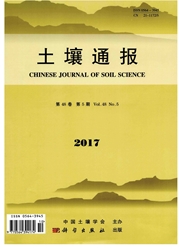

 中文摘要:
中文摘要:
当前的学习在在在包含二不同 Pb 的土壤种的大米栽培变种 Yangdao 6 和 Yu 44 的毒性,举起, translocation,和累积铺平的铅(Pb ) 上调查了 nano 硅(Si ) 和普通 Si 的效果(500 mgkg 1 和 1000 mgkg 1) 。结果证明 Si 申请在米饭生长上减轻了 Pb 的有毒的效果。分别地,比没有 Si 供应(控制) 的植物的那些更高在植物的 biomasses 与普通 Si 和 nano-Si 供应了的 500 和 1000 mgkg 1, 的土壤 Pb 处理下面是 1.8%5.2% 和 3.3%11.8% 。比作控制,在与普通 Si 和 nano-Si 供应的米饭射击的 Pb 集中被 14.3%31.4% 和 27.6%54.0% 分别地减少。在与普通 Si 和 nano-Si 对待的米饭谷物的 Pb 集中分别地由 21.3%40.9% 和 38.6%64.8% 减少了。到射击的从根的 Pb translocation 因素(TF ) 分别地由 15.0%29.3% 和 25.6%50.8% 减少了。分别地,到谷物的从射击的 TF 在 Si 申请以后由 8.3%13.7% 和 15.3%21.1% 减少了。在植物上观察的效果的大小在下列顺序减少了:nano-Si 处理 > 普通 Si 处理和 high-grain-积累 Pb 栽培变种(Yangdao 6 )> low-grain-Pbaccumulating 栽培变种(Yu 44 ) 和重 Pb 应力(1000 mgkg 1)> 中等 Pb 应力(500 mgkg 1)> 没有 Pb 处理。学习的结果显示 nano-Si 是比在改善的普通 Si 更有效的米饭生长上的 Pb 的有毒的效果,阻止 Pb 转移米饭根到未葬部分,和在米饭谷物,特别在 high-Pbaccumulating 米饭栽培变种并且在重重地弄脏 Pb 的土壤的堵住的 Pb 累积。
 英文摘要:
英文摘要:
The current study investigated the effects of nano-silicon (Si) and common Si on lead (Pb) toxicity, uptake, translocation, and accumulation in the rice cultivars Yangdao 6 and Yu 44 grown in soil containing two different Pb levels (500 mg.kg-1 and 1000 mg.kgl). The results showed that Si application alleviated the toxic effects of Pb on rice growth. Under soil Pb treatments of 500 and 1000mg.kg-1, the biomasses of plants supplied with common Si and nano-Si were 1.8%-5.2% and 3.3%- 11.8% higher, respectively, than those of plants with no Si supply (control). Compared to the control, Pb concentra- tions in rice shoots supplied with common Si and nano-Si were reduced by 14.3%-31.4% and 27.6%-54.0%, respectively. Pb concentrations in rice grains treated with common Si and nano-Si decreased by 21.3%-40.9% and 38.6%--64.8%, respectively. Pb translocation factors (TFs) from roots to shoots decreased by 15.0%-29.3% and 25.6%-50.8%, respectively. The TFs from shoots to grains reduced by 8.3 %--13.7% and 15.3%-21.1%, respectively, after Si application. The magnitudes of the effects observed on plants decreased in the following order: nano-Si treatment 〉 common Si treatment and high-grain- Pb-accumulating cultivar (Yangdao 6)〉 low-grain-Pb- accumulatir~ cultivar (Yu 44) and heavy Pb stress (1000 mg.kg-1) 〉 moderate Pb stress (500 mg-kg-1) 〉 no Pb treatment. The results of the study indicate that nano-Si is more efficient than common Si in ameliorating the toxic effects of Pb on rice growth, preventing Pb transfer from rice roots to aboveground parts, and blocking Pb accumulation in rice grains, especially in high-Pb- accumulating rice cultivars and in heavily Pb-polluted soils.
 同期刊论文项目
同期刊论文项目
 同项目期刊论文
同项目期刊论文
 期刊信息
期刊信息
